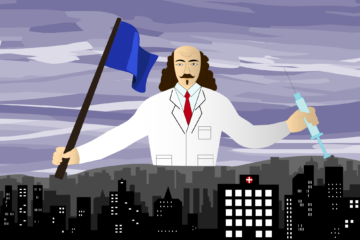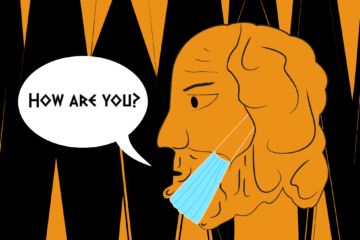One particular social symptom which is hard not to notice is the trend of millennial couples adopting dogs and cats and ‘raising them as their own’. I admit, this fetish has bothered me for the past decade. And as the years passed, it has only become more prevalent, provoking me with cringe-worthy images.
It seems to have become necessary to feed these pet animals premium meat, shower them with displays of empathy, speak to them as if they have human cognition, buy them costumes, cut an evening short because the ‘baby’ is feeling lonely at home, and in extreme cases, even take them out for a walk in a baby carriage.It seems obvious to me, that more than just pets, they have been occupying the symbolic space of parenthood and having children.
At first I was wondering whether I simply do not like animals. Or more seriously, one might ask whether this concern is rooted in some form of get-married-and-have-children conservatism. But in this two-part essay, I will precisely seek to present a critique which is far from conservative. In fact, it is a disgust at a form of conservatism concealed by displays of progress.
Trans-patriarchy
To make sure this fetish has nothing to do with animals, let’s look at another type of ideological misrecognition.
Consider queer people seeking to get married. First, the movement sought to critique and dismantle the biopolitics of sexual and matrimonial norms which had been designed around the heterosexual couple and its gender roles. But after succeeding in doing so, instead of revolutionising sexuality and the social understanding of gender, the movement simply changed the content while holding onto the old structure proposing the same obligations, privileges, rules, and at the end, logical inconsistencies that traditional relations envisage. Queer people now demanded that they get married, raise children, pay joint taxes, live happily ever after and get divorced like the traditional heterosexual couples.
The question to ask the movement is therefore: why all the lobbying, if all you wanted to achieve is a replication of the same rituals supporting the same political constructs as men and women did in a patriarchal society?
While we’re at it, the same goes for transsexual culture: After fighting cultural norms of sex and gender, and after being liberated from the social demands placed on sexes, why is it that many transsexuals make the recourse to bimbo-ification and macho-ification, thus committing to the unrealistic standards of femininity and masculinity? – A feminist’s horror story.
There is therefore a noticeable shift in signification: in an era when society is moving towards the distillation of human persons from he/she pronouns, we also witness these same pronouns being transplanted and ideologically enforced onto animals as if they have some human-derived dignity. Slowly, it is becoming offensive to call a person ‘him’ or ‘her’, due to having assumed their gender and imposed your norms upon them. But it is also becoming just as offensive to refer to a home-raised dog or cat as simply ‘it’; such a statement would be received by the dog’s “parents” as a denouncement of their love and affection for their pet, that is, a statement stripping the animal from its virtual humanity.
So the answer to the above question has to be given from an ideological reflection: after disavowing the grandma who so oppressively demands grandchildren, the young millennials seem to have remained nonetheless committed to her demand. They adopt a being that can occupy a symbolic space within that paternal role, without actually having to commit to the responsibilities of having an actual child. More critically, they will still be able to enjoy ideology while having rebelled against the Law-giver.
A limit to liberal thought thus becomes apparent: We want to reject the laws set by others, only so that we may ‘freely’ choose to obey them nonetheless.
The vegan who feeds “tortured animals” to their cherished cat
So why does this all matter anyway?
On the ethical side, I already find it questionable that the first world competes so fiercely to retain hold of the distribution of the world’s resources, only to then divert these resources to fetishes. Put more simply, it is rather disturbing to see some people invest so much money, effort and emotions in an animal who does not need it, while humans in other parts of the world barely have access to antibiotics.
The Orwellian phrase that “all animals are equal, but some are more equal than others” now obtains a more universal – and perverse – application. Even some dogs have better access to justice than other humans.
A very emblematic near future scenario would be if in Europe, dogs and cats start being vaccinated against the coronavirus while the vaccine is barely accessible in other countries. The justification would be that they are an emotional and psychological support to their “parents”. Of course, this will not (probably) happen for practical international political considerations. But if the vaccine had to be offered for domestic animals, we can be quite certain that most pet-owners would have no qualms about vaccinating their dogs and cats – even while knowing that there are other people who still have no access to it but would like to.
So what we have to ask at this point is, why do the subjects of late capitalism so willingly dive into this symbolic perversion? That is, why is it that we have evolved into a culture of hyper-morality (invoking empathy for the feelings caused by pronouns, and the emotions of a dog) combined with a lifestyle of indifference? Why do we work so hard to attain social change and justice, but so actively choose to ignore injustices?
Why do we have a two-tier application of morality?
Triple Distilled Content
The sincerest answer to the above question would probably be: ‘I want to be good, to be of help to others and to spread happiness, but not at the cost of my own happiness and the comforts that I am already used to’.
So the intended result has to be a moral act distilled of moral sacrifices – a selective retreat from social structure by which the individual adopts sterilised versions of social norms. While still hoping to retain the benefits of engaging in these norms, the subject seeks to exempt itself from the particular content of the old social demands.
One can discard parenthood while enjoying the maternal experience of nurturing something. One can reject the rigid gender roles and their inherent oppression, while still getting to enjoy the constructed rituals tied to them, such as marriage and romance. One can battle environmental impact while still enjoying the act of consumption. One can have the rich without the poor.
Holding onto Texas Hold’em
The ethical act demands risks, but we want one without such a demand. Therefore, my claim is that there is an evident element of hypocrisy: we do not reject an ideology as a whole, but only our identification within it.
We engage in this retreat because for the most part, we don’t actually desire for the game to change, since that would mean that we will have to play another game whose rules we don’t yet know. So instead, we simply campaign for a reshuffle and dream of getting a better hand – a hand with five Aces.
We still relish in the vague fantasy of big change. But if it happens that our dream suddenly appears realisable – that our bluff is called – we also realise that we cannot think outside the old system. Naturally, the result that we then settle for is a mere processed version of what we already know. We place the ‘revolutionary’ content into a new constitution that has the same form as the old.
The reason for our remaining attached to the game is quite understandable: it is impossible for us to validate ourselves without the application of rules which, after all, provide the entire foundation for the appraisal of ourselves and others. We depend on structure and norms, not just for security, but for things to make sense, for us to exist in a matrix of meanings connected in a structure.
The form persists.



0 Comments